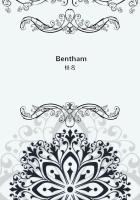A romance on the plan of Gil Blas, adapted to American society and manners, would cease to be a romance. The experience of many individuals among us, who think it hardly worth the telling, would equal the vicissitudes of the Spaniard's earlier life; while their ultimate success, or the point whither they tend, may be incomparably higher than any that a novelist would imagine for his hero. Holgrave, as he told Phoebe somewhat proudly, could not boast of his origin, unless as being exceedingly humble, nor of his education, except that it had been the scantiest possible, and obtained by a few winter-months' attendance at a district school. Left early to his own guidance, he had begun to be self-dependent while yet a boy; and it was a condition aptly suited to his natural force of will. Though now but twenty-two years old (lacking some months, which are years in such a life), he had already been, first, a country schoolmaster; next, a salesman in a country store; and, either at the same time or afterwards, the political editor of a country newspaper. He had subsequently travelled New England and the Middle States, as a peddler, in the employment of a Connecticut manufactory of cologne-water and other essences. In an episodical way he had studied and practised dentistry, and with very flattering success, especially in many of the factory-towns along our inland streams.
As a supernumerary official, of some kind or other, aboard a packet-ship, he had visited Europe, and found means, before his return, to see Italy, and part of France and Germany. At a later period he had spent some months in a community of Fourierists.
Still more recently he had been a public lecturer on Mesmerism, for which science (as he assured Phoebe, and, indeed, satisfactorily proved, by putting Chanticleer, who happened to be scratching near by, to sleep) he had very remarkable endowments.
His present phase, as a daguerreotypist, was of no more importance in his own view, nor likely to be more permanent, than any of the preceding ones. It had been taken up with the careless alacrity of an adventurer, who had his bread to earn. It would be thrown aside as carelessly, whenever he should choose to earn his bread by some other equally digressive means. But what was most remarkable, and, perhaps, showed a more than common poise in the young man, was the fact that, amid all these personal vicissitudes, he had never lost his identity. Homeless as he had been,--continually changing his whereabout, and, therefore, responsible neither to public opinion nor to individuals,--putting off one exterior, and snatching up another, to be soon shifted for a third,--he had never violated the innermost man, but had carried his conscience along with him.
It was impossible to know Holgrave without recognizing this to be the fact. Hepzibah had seen it. Phoebe soon saw it likewise, and gave him the sort of confidence which such a certainty inspires.
She was startled. however, and sometimes repelled,--not by any doubt of his integrity to whatever law he acknowledged, but by a sense that his law differed from her own. He made her uneasy, and seemed to unsettle everything around her, by his lack of reverence for what was fixed, unless, at a moment's warning, it could establish its right to hold its ground.
Then, moreover, she scarcely thought him affectionate in his nature.
He was too calm and cool an observer. Phoebe felt his eye, often;his heart, seldom or never. He took a certain kind of interest in Hepzibah and her brother, and Phoebe herself. He studied them attentively, and allowed no slightest circumstance of their individualities to escape him. He was ready to do them whatever good he might; but, after all, he never exactly made common cause with them, nor gave any reliable evidence that he loved them better in proportion as he knew them more. In his relations with them, he seemed to be in quest of mental food, not heart-sustenance.
Phoebe could not conceive what interested him so much in her friends and herself, intellectually, since he cared nothing for them, or, comparatively, so little, as objects of human affection.
Always, in his interviews with Phoebe, the artist made especial inquiry as to the welfare of Clifford, whom, except at the Sunday festival, he seldom saw.
"Does he still seem happy?" he asked one day.
"As happy as a child," answered Phoebe; "but--like a child, too --very easily disturbed.""How disturbed?" inquired Holgrave. "By things without, or by thoughts within?""I cannot see his thoughts! How should I?" replied Phoebe with ****** piquancy. "Very often his humor changes without any reason that can be guessed at, just as a cloud comes over the sun. Latterly, since I have begun to know him better, I feel it to be not quite right to look closely into his moods. He has had such a great sorrow, that his heart is made all solemn and sacred by it. When he is cheerful,--when the sun shines into his mind, --then I venture to peep in, just as far as the light reaches, but no further. It is holy ground where the shadow falls!""How prettily you express this sentiment!" said the artist. "I can understand the feeling, without possessing it. Had I your opportunities, no scruples would prevent me from fathoming Clifford to the full depth of my plummet-line!""How strange that you should wish it!" remarked Phoebe involuntarily. "What is Cousin Clifford to you?""Oh, nothing,--of course, nothing!" answered Holgrave with a smile.















